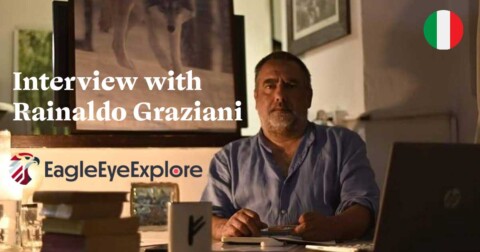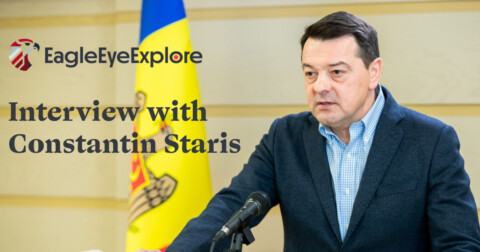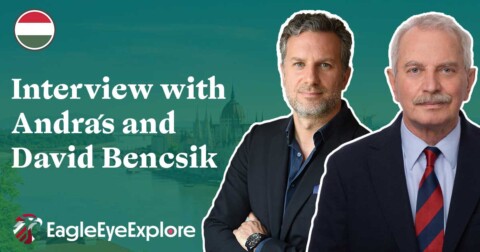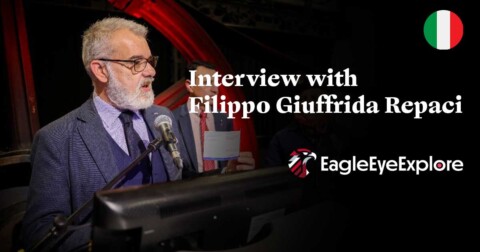Henri de Grossouvre, an analyst and geopolitician of a tellurocratic orientation and the author of monumental works, boldly confronts the global hegemon. From the position of an advocate of the concept that Europe should break the chains binding it to the United States and form an alliance with Russia, de Grossouvre has for years confidently defied the Empire, setting forth, in a time of historical reshuffling, geopolitical vectors that are not so popular. Hated among Euro-Atlanticists, the French political scientist enjoys great respect in the circles of global intellectuals. The foreword to the first edition of his book “Paris-Berlin-Moscow: The Path to Independence and Peace” was written by Pierre-Marie Gallois, one of General de Gaulle’s most prominent associates, the author of the concept of French nuclear autonomy, and a declared opponent of American policy and the wars the U.S. led in the post-Cold War period. This should come as no surprise. Henri de Grossouvre is a fervent advocate of Gaullist ideas.
The world order as we have known it is counting its final days with the return of Donald Trump to the White House. Is it unfounded to claim that we are witnessing a historic moment inevitably leading to the collapse of global institutions and the return of the nation-state on European soil?
The election of Donald Trump in the United States is very clearly a major factor of change in the United States, in Europe, and around the world. When I speak of Europe, I am referring to the geographical entity that shares a common culture—stretching from Western Europe (England, France, Portugal) to most of Russia—and not the European Union in the strict sense. The European Union concerns only part of Europe and, paradoxically, does not represent a truly European project, insofar as it increasingly positions itself merely as a stage in globalization, severed from the historical, cultural, and religious foundations of Europe.
Trump’s election reshuffles the deck and brings into broad daylight the opposition—if we simplify—between the globalists, of whom the Biden administration was a textbook example, and the “traditionalists,” who are committed to a traditional conception of peoples, nations, and the organization of society. The media tends to focus on the person of Donald Trump, but people often forget his team. There are strong personalities who, each in their respective areas of expertise, are developing a coherent alternative program for the United States and its relations with other countries.
I am thinking in particular of Vice President J.D. Vance, who is young, well-structured, an openly conservative Catholic, and from a working-class background, yet managed to gain access to an elite American university after serving in the military. His speech at the Munich Security Conference deeply unsettled the Brussels elites and their allies. I encourage your readers to read or listen to it in full—it is very insightful.
In that speech, he speaks in particular about what he sees as the most serious threat to Europe: the “enemy from within,” stemming from a drift into deconstruction (theorized by the French philosopher Jacques Derrida, whose ideas developed further in the United States), which in turn gave rise to woke totalitarianism.
The sharp geopolitical shift of the United States places Europe before significant challenges, primarily those related to the fate of NATO, but also the possibility of creating a new defense alliance…?
It is often naively believed that NATO’s enlargement is a sign of its strength and vitality. I believe, on the contrary, that it is a sign of weakness. No one truly believes anymore in the actual enforcement of Article 5 (the provision for military intervention by NATO in the case of an attack on one of its members).
We have seen the same phenomenon in the European Union. Paradoxically, it was the British who pushed for the EU’s eastward enlargement, fully aware that it would weaken the EU’s political power, as it would be impossible for all member states to agree on strategic issues—such as relations with Russia, China, or the United States. This transformed the EU into little more than a market without any real political power.
Everyone knows that the United States and NATO have been indirectly involved in the war in Ukraine—and that British, Polish, and American special forces were on the ground as early as 2014—but all well-informed experts, outside of television studios, acknowledged that Ukraine and its supporters could not win the war, which is exactly what we are witnessing today.
The United States is gradually withdrawing militarily from Europe, and NATO is set to decline progressively. But it is essential for Europeans to replace it with something of their own.
France still has a substantial defense industry and is the only continental European country—along with Russia—capable of building a civilian and military aircraft from start to finish without relying on the Anglo-Saxons. France, Germany, Sweden, and Italy together are capable of building the foundations of a coherent and credible European defense (both military and industrial), but the will and coordination are necessary.
Otherwise, Europe will be nothing more than a space manipulated and trapped between the United States and Russia.
The European Union is increasingly clumsy in articulating its own strategy and interests. Is it facing the threat of collapse, or perhaps the formation of a looser confederation of states?
The problem with the European Union is that it was never conceived as a coherent project with clear borders—no one knows what the definitive borders of the EU are. The French have a mental geographical image of France, Americans of the United States, the British of the United Kingdom—no one has a mental image of the borders or shape of the European Union.
Moreover, we have rejected the very foundations of our culture, which are threefold and on which we must build a Europe of nations: the Greek legacy, the Roman legacy, and Christianity. Everything is there!
In fact, the European project as it is currently conceived in Brussels is not truly a European project—it is merely another phase of globalization. The historical references of Europe have been replaced by an ideology of minority rights whose goal is clearly to dismantle European peoples and the family structures that have been the foundation of our society and culture for millennia.

Some member states are expressing increasingly open and categorical disagreement regarding key directions… ?
With 27 member states, it is impossible to agree on defining common strategic objectives. Therefore, progress must come from a group of pioneer countries making concrete advances in specific areas—for example, France, Germany and/or Italy, Poland, and a few smaller countries willing to join such a project.
The institutions of the European Union need to be rethought starting now. I believe that Strasbourg will play a foundational role in this renewal. Strasbourg is not only the seat of the European Parliament but also of the Council of Europe (which includes Central European countries and Russia, even those outside the EU), the Assembly of European Regions, and many other international organizations unknown to the general public.
Strasbourg is also a symbol of the Franco-German base, a link to Central Europe (I published an article on this topic), and a platform for significant Catholic-Orthodox dialogue.
Clarify the heightened interest of globalists in Romania. What about Poland? What role is assigned to these countries in the new security architecture of Eastern Europe?
NATO and the United States have invested heavily in Romania. It is a country I know well, having lived there for a year and a half and speaking a bit of the language. In fact, I returned there recently, at the end of 2024, and was able to meet with political and religious leaders.
Romania is the most populous country in Central Europe after Poland. It shares a border of nearly 600 kilometers with Ukraine, has access to the strategically vital Black Sea, and—after Poland—is one of the most important countries in the so-called Euro-Atlantic system in Central Europe.
Poland aspires to take on the role currently played by both Germany and France within the European Union. While Poland certainly has many strengths, this ambition is clearly excessive. Nevertheless, it is already influential and will become increasingly so within the EU alongside France, Germany, and Italy.
Can the efforts to preserve Romania at all costs also be explained by the creation of a new axis — Hungary, Slovakia, Croatia — which has the potential to threaten Brussels as the center of decision-making?
There is indeed an emerging alternative axis among Hungary, Slovakia, and Croatia. That is why it is so important for the globalists currently concentrated in Brussels not to “lose” Romania—for the reasons already mentioned: the presence of NATO, access to the Black Sea, and borders with Ukraine and the former Soviet republic of Moldova.
Historically, Romania has always aligned itself with the most powerful empire of the moment, but its population is beginning to understand that it has no real interest in blindly supporting Brussels’ strategy of backing the losing side.
What happened with the disqualification of the favored presidential candidate is deeply troubling. Just days before the arrest of candidate Georgescu, Tudorel Toader—former Romanian Minister of Justice and a member of the Constitutional Court, which was to rule on Georgescu’s eligibility—had publicly stated that he saw no valid reason for the Court to block Georgescu’s candidacy!
In any case, I believe Romania will continue to play an important role within the European Union and in Central Europe. The Romanian presidential elections, now postponed to May, will be important to follow closely.
Alongside Hungary, Croatia, Slovakia, Serbia, and Romania, we are seeing the formation of a group of European countries with territorial continuity that could effectively position itself as an alternative bloc.
Which countries do you see as new geopolitical focal points in Europe over the next decade? Is it possible for a new geopolitical pole to emerge in Central and Southeastern Europe, independent of Washington and Brussels?
In Western Europe, the key countries—each with a specific tradition of relations with both the United States and Russia—are France, Germany, and Italy. To these three we must add Poland, whose population, economy, and ambition allow it to play a major role and with whom cooperation will be necessary.
In Central Europe, there is clearly an emerging group formed by Hungary, Slovakia, likely the Czech Republic and Croatia, and perhaps soon Romania and Serbia. This group could find common ground with Poland. Even though Serbia is not in the EU, it is destined to be part of this group.
However, uncertainty remains great, because the confrontation between globalists and “traditionalists” cuts through every country, from the smallest to the largest.
It seems that the moves of the establishment in France and Germany, paradoxically, are increasingly pushing the people into the arms of the sovereignists. Is space opening up for serious political changes in these countries?
Despite the EU’s enlargement to include Central European countries and the growing and justified importance of countries like Poland, France and Germany—when united—still exert decisive influence over the EU’s direction.
In recent years, their relationship has not been particularly good, and their leadership role has been challenged by the France–Italy partnership following the Quirinal Treaty in 2021, which came after the Franco-German Aachen Treaty of 2019. The Treaty of Aachen was an update of the historic Élysée Treaty signed by General de Gaulle and Konrad Adenauer in 1963.
France and Germany together contribute roughly half of the EU’s total budget (52.5% in 2018 and 42.1% in 2023), while countries like Estonia have received more than they contributed. I would also point out that the current EU High Representative for Foreign Affairs, Kaja Kallas, is closely tied to American globalist circles and, therefore, to the dominant ideology in Brussels today.
All of this is to say: if France and Germany were to join the alternative sovereigntist camp, the destiny of the European Union would be in their hands.
Austria is a small country but plays an important role, due to its linguistic and cultural ties with Germany and, above all, its deep understanding of Central and Eastern Europe.

So, today, everything is possible in Europe…?
For the first time since 1945, the common interests of Donald Trump’s United States, JD Vance, and Russia align in supporting the emergence of an autonomous Europe. This is both a chance and an opportunity for all conservatives and sovereigntists across Europe to build a “Europe of Nations” in the sense intended by General de Gaulle.
My geopolitical thinking on Europe is rooted in the thought and action of General de Gaulle. Today, the General remains a source of inspiration for major U.S. leaders (JD Vance’s admiration for de Gaulle is well known), for Vladimir Putin and Sergey Lavrov, and for all true French conservatives—and often for those in other European countries as well.
The General was, moreover, particularly devoted to Franco-Serbian friendship. The battle is beginning, and it will be difficult—but I am optimistic.
How much do Serbian lands and the Serbian factor intrigue the architects of global politics? The case of Milorad Dodik suggests that the Serbian question is very important to the Euro-Atlantic current.
I have often written in my articles about the historical, geographical, and strategic importance of the Serbs and of the two Serbian states that today lie at the heart of Europe. They represent a strategic bridge between the two Europes—Pope John Paul II used to speak of the “two lungs of Europe”—and a historical bastion of resistance to empires.
With the return of Donald Trump to power, the globalist camp—which, having lost power in the United States, is now particularly entrenched in Brussels—has turned its attention to undermining what the Serbs represent. The push to centralize power in Bosnia and Herzegovina is clearly a pretext to marginalize the Serbs and the president of the Republic of Srpska.
I believe that Banja Luka will manage to maintain its autonomy and to uphold the Dayton Peace Accords, and I also believe it is in the best interest of the Serbs as a whole to preserve both Serbian states.
Serbia and Republika Srpska function according to the system of communicating vessels. Can the protests in Serbia be isolated from the attacks on the Republika Srpska across the Drina, or is there an internal connection?
In nearly every popular movement, there is usually a combination of legitimate grievances and external manipulations. This is certainly the case in Serbia. I recently offered an analysis of the situation and its origins in the excellent magazine *POREDAK*, and I would refer your readers to that article.
Since “small Serbia” plays an important and strategic role—yesterday as today—it has become a battleground for competing powers: China, Russia, the United States, and EU countries, with a particularly notable role played by Croatia and its intelligence services for historical reasons. Croatia’s intelligence agencies rely to a significant extent on their German and American partners.
Serbia has no choice but to skillfully manage a balance of dependencies, much like Hungary under Prime Minister Orbán. However, a radical change of regime in the United States should, in the medium term, work in Serbia’s favor—even though the globalists and the agencies they have supported, such as those funded by USAID, are now firing their last bullets in anticipation of losing political and financial backing.
The European Union also has economic interests in Serbia—most notably the recent agreement on lithium—so it has no desire to destabilize Serbia too much.
Can we catch a glimpse of what the post-war map of Ukraine might look like?
I believe we are heading toward a de facto partition—one part under Russian control, probably a neutral zone, and in the West, an exclusively Ukrainian-speaking region destined for integration into the European Union.
The main question is where the borders of this new arrangement in Ukraine will ultimately be drawn.





